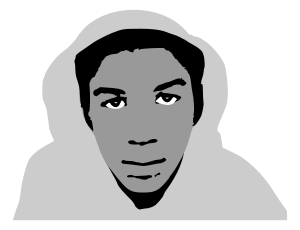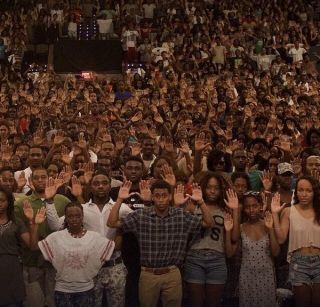Autism
Catastrophic Encounters and Autistic Identity
Parenting against injustice.
Posted August 31, 2014
How do you react, as a parent, when you have a child who faces judgement and danger, because of his or her racial and neurological differences? Here is one mother's perspective from activist, advocate, writer, and researcher Kerima Çevik.
(A version of this article was previously published on the Intersected Disability blog)
Our son moves through his life silently. He does not use verbal speech; he is a performance artist of communication. When he performs well, he is understood, and his audience erupts in applause, compliments, and interaction. But all performances are not successful ones, and all spectators are not kind. If one day he has an off moment on the stage of his own life, an audience of strangers not familiar with him or his unorthodox message transmission methodology might turn on him and do him deadly harm. That potentially catastrophic event is the nightmare that drives many of my advocacy efforts. They are in fact actions taken to prepare him and the society that discriminates against him for a time when such an encounter might take place. Because when encounters occur between armed individuals and autistic males of color, the outcome is disproportionately fatal. Often young men are killed in front of their own loved ones. Fighting the odds that took the lives of Paul Childs III, Ronald Madison, Steven Eugene Washington, Stephon Watts, and countless others is even more challenging than trying to explain to our Black sons why who they are makes them an endangered population. The goal for White families is to insure their sons make it to a good university or a good career. The goal for our families is to fight to help our sons survive their adolescence.

Had my pre-teen, autistic, multiracial son been where Trayvon Martin was on the night he was murdered by George Zimmerman, the outcome would have been the same. Had he been wandering down the streets of Ferguson, Missouri, in the wrong place at the wrong time he would have suffered the same fate as Michael Brown. Every behavior that our son uses to bridge the communication gap between him and those who use verbal speech would have been viewed as a threat. His stimming and vocalizations would have been prejudged. After all, Zimmerman ignored law enforcement commands to stay put, armed himself and deliberately pursued someone he considered a suspect based entirely on that teen's race. We now know that living in or near Ferguson for anyone considered Black and male, especially if it is decided by law enforcement that individual is “behaving erratically”, marks that individual for death. My son is visibly different. At age eleven, he is taller and heavier than 98% of his peers. He does not look white. He looks like an amalgamation of his Hispanic/ Black/ Indigenous/ Turkic ancestors. He doesn't always process what he sees and hears effectively or immediately.
As other parents try to explain to their Black children why a white man who shot a Black teen is allowed to go free, I have not. Not because I assume my son is not competent to understand, but because he doesn't need to be told something is terribly wrong. He senses it. He felt the deflating of the spirit in our living room at the moment of the verdict; he saw the grim resignation on our faces. He knows something in the world has changed in a bad way. He doesn't need an explanation. He is a self-taught body language expert. He feels the change because acts of racism cannot be hidden. They cannot be explained away. They cannot be simplified. They cannot be parsed and presented in a more digestible form. Living the life of a person who is the object of hate because of visible difference is something my son and I know all too well. We cannot pass for anything or anyone else. So as his parents we must stand firm and by our body language and nonverbal cues, let our son see us visually insist upon the acceptance and respect of others. If we do not, we will die accepting that those in society who are the alchemists of hate have won their war to make systemic bigotry and ableism the established norm. My son's life literally depends on our family transmitting the right understanding to him.
My son knows that his neurology and our physical appearance engender negativity in many outside our own family. He knows when his mother, sister, and father are subjected to intolerance and hate. No one needs to tell him the world is cruelly unfair. He sees it each day we go about our daily lives. The events in Ferguson and Trayvon Martin murder trial verdict are not teachable moments. They are public declarations of decades of institutionalized racism the existence of which, once seen, cannot be unseen.
So it is not my purpose as a parent to point out something my son already knows. It is my job to teach him how to continue each day with his head up despite the efforts of others to try and transmute fear of difference into hatred of melanin and neurological difference. Each time we encounter this hate, my son needs to instinctively know to recognize it. He needs the tools to overcome its impact. We must accomplish this without verbal speech.
I will not say to him or anyone reading this that hate can be overcome and defeated with love alone. What I can say is that we who are the intersected parents of minority neurodivergent children must first teach our children to love and respect themselves. Self-acceptance becomes self-advocacy. We cannot teach self-acceptance viscerally to our nonspeaking loved ones if we claim to hate a part of what they are. We must first excise that ableism from ourselves so that our behavior reflects acceptance. We must send cues through action and body language, that we accept our children into our hearts as they are. We have to show them that those who hate, and those who fuel hatred to oppress, will not overcome if we know ourselves and fully commit to embracing who we are. Our nonspeaking tweens, teens, and young adults will do what we do, not what we say.

I have pledged to teach my son, through the performance artistry of each day's interactions, what I was taught by mentors and those who truly loved and accepted me for who I am. I convey to him that we love him as he is, therefore he must love and accept himself as he is, even if others do not. I show him with my actions that different is not less. We are celebrating the rest of this month showing our neurodivergent son that the universe of who he is internally is an infinite system no hatred can diminish. I try by example to show him that we are created as we are because the universe loves infinite variety. This is the way we are working through watching white men continue to go free for killing Black teens, and autistic males of color dying in catastrophic encounters.
Now I pray that my son will be prepared for life as a young man. But I will not hide him away hoping he'll be safe because those who would harm us continue to get away with murder. We will stand against the hatred together now, hoping he learns that the means by which he can capably stand alone against bigotry and survive is to know he is not less than any man, and better than most.
In memory of Michael Brown, Jordan Davis, Travyon Martin, Paul Childs III, Ronald Madison, Steven Eugene Washington, Stephon Watts, Jawara Henry, Corey Foster and all those who joined them too soon.
Dedicated to my son Mustafa, in love and hope.
Kerima Çevik is an editor and contributing writer at Ollibean, a legislative advocate and a parent activist for autism and social justice. An independent researcher, she has spoken at autism and disability rights conferences and workshops. She blogs about autism, disability rights, and life with her nonspeaking autistic son at The Autism Wars (theautismwars.blogspot.com), intersectionality and social justice at I∩tersected (intersectedisability.blogspot.com), and is founder of the Amplify Autistic Voices project at amplifyautistics.blogspot.com.



